| Listing 1 - 10 of 46 | << page >> |
Sort by
|
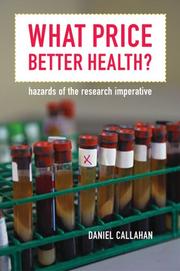
ISBN: 0520227719 Year: 2003 Publisher: Berkeley, Calif. University of California Press
Abstract | Keywords | Export | Availability | Bookmark
 Loading...
Loading...Choose an application
- Reference Manager
- EndNote
- RefWorks (Direct export to RefWorks)
The idea that we have an unlimited moral imperative to pursue medical research is deeply rooted in American society and medicine. This work exposes the ways in which such a seemingly high and humane ideal can be corrupted and distorted into a harmful practice.
Medicine --- biomedisch, medisch-wetenschappelijk onderzoek --- #GBIB:CBMER --- Health Workforce --- Research --- Social aspects --- recherche biomédicale --- Professional ethics. Deontology --- Human medicine
Book
Abstract | Keywords | Export | Availability | Bookmark
 Loading...
Loading...Choose an application
- Reference Manager
- EndNote
- RefWorks (Direct export to RefWorks)
Les équipes hospitalières sont fréquemment amenées à conserver du " matériel biologique " : pour la réalisation à visée diagnostique d'examens de biologie médicale, pour une finalité thérapeutique au bénéfice d'autres patients ou encore, de plus en plus souvent, pour réaliser des recherches médicales. Des collections et des banques d'échantillons sont constituées dans ce cadre, à partir desquelles peuvent s'effectuer des échanges et transferts entre équipes engagées dans des partenariats de recherche. Le recueil, la conservation, puis l'utilisation de ces ressources biologiques sont aujourd'hui strictement réglementés. Il ne doit jamais être perdu de vue que les échantillons sont prélevés sur des personnes, qui doivent légitimement consentir à l'usage qui en est fait. La conservation des échantillons tout comme les fichiers de données personnelles qui y sont liés, doivent selon le cas être autorisées ou déclarées. Enfin, les transferts de matériel biologique ne peuvent s'effectuer que sur la base d'accords rigoureusement conclus.
lichaamsmateriaal (lichaam, menselijk lichaamsmateriaal) --- medisch-wetenschappelijk onderzoek --- biomedisch, medisch-wetenschappelijk onderzoek --- geïnformeerde vrijwillige toestemming (instemming) --- goede klinische praktijken --- rechtsbescherming --- matériel corporel humain, (corps humain) --- recherche médicale --- recherche biomédicale --- consentement libre et éclairé --- bonnes pratiques cliniques --- protection juridique --- Professional ethics. Deontology --- Medical law --- France
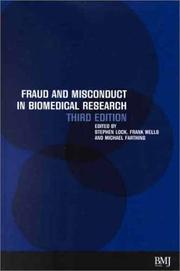

ISBN: 0727915088 Year: 2001 Publisher: London BMJ
Abstract | Keywords | Export | Availability | Bookmark
 Loading...
Loading...Choose an application
- Reference Manager
- EndNote
- RefWorks (Direct export to RefWorks)
It is important to be aware of the legal and ethical frameworks within which research is undertaken and of the steps that are available to prevent fraudulent and dishonest research being undertaken and written up. This book, originally put together by Stephen Lock, an editor of the British Medical Journal, and now revised extensively by Michael Farthing, editor of the gastroenterology journal Gut, provides an overview of the entire topic. Background material on the regulatory frameworks, in North America as well as Europe, is laid out in detail, and the history of fraud and misconduct is illustrated admirably by contributions from Stephen Lock and Frank Wells, a co-editor and expert in ethical and legal issues relating to the pharmaceutical industry. A series of slightly less riveting accounts of individual country’s approaches to research fraud follows, with the best chapters coming towards the end, where personal experiences are used to illuminate the devastating effects that involvement in research fraud can have for patients and practitioners. Michael Farthing has contributed an excellent editorial view on research misconduct to conclude the book.
Medicine --- Physicians --- Médecine --- Médecins --- Research. --- Malpractice. --- Recherche --- Responsabilité professionnelle --- wetenschapsethiek (wetenschappelijk wangedrag, fraude) --- biomedisch, medisch-wetenschappelijk onderzoek --- éthique de la science (inconduite scientifique) --- recherche biomédicale --- Médecine --- Médecins --- Responsabilité professionnelle
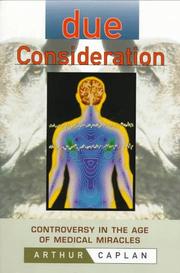
ISBN: 047118344X Year: 1998 Publisher: New York John Wiley & sons
Abstract | Keywords | Export | Availability | Bookmark
 Loading...
Loading...Choose an application
- Reference Manager
- EndNote
- RefWorks (Direct export to RefWorks)
Medical ethics. --- biomedisch, medisch-wetenschappelijk onderzoek --- recherche biomédicale --- Medical ethics --- Biomedical ethics --- Clinical ethics --- Ethics, Medical --- Health care ethics --- Medical care --- Medicine --- Bioethics --- Professional ethics --- Nursing ethics --- Social medicine --- Moral and ethical aspects
Book
ISBN: 9031330663 Year: 2000 Publisher: Houten/Diegem Bohn Stafleu Van Loghum
Abstract | Keywords | Export | Availability | Bookmark
 Loading...
Loading...Choose an application
- Reference Manager
- EndNote
- RefWorks (Direct export to RefWorks)
De huidige stortvloed van publicaties over medisch onderzoek en medische ontwikkelingen is voor de praktiserende arts nauwelijks bij te houden. De hoeveel snel beschikbare informatie neemt intussen immense proporties aan nu Medline en andere medische informatie onbeperkt via Internet geraadpleegd kunnen worden. Ook de moderne patiënten en hun familieleden hebben toegang tot recente medische informatie; ze verwachten van de arts de nieuwste diagnostiek en behandeling.Evidence-based medicine kan helpen om aan deze hooggespannen verwachtingen te voldoen en beoogt de individuele ervaring van de behandelaar te combineren met de resultaten van het beste klinische onderzoek; het gaat over oplossen van klinische problemen en levert hulpmiddelen om de medische literatuur efficiënt te gebruiken bij het afwegen van voordelen en nadelen van behandelmogelijkheden in het licht van de specifieke omstandigheden waarin de patiënt verkeert en van de wensen van de patiënt.
wetenschappelijk onderzoek --- geneeskunde --- Human medicine --- evidence-based methodiek --- #GBIB:CBMER --- biomedisch, medisch-wetenschappelijk onderzoek --- medisch-wetenschappelijk onderzoek --- medische praktijk --- evidence-based geneeskunde --- methodologie --- Geneeskunde - Geneeskunst --- Medisch onderzoek --- Documentaire wetenschappen --- Pers en massamedium --- 003 --- geneeskundige opleiding (gez) --- informatieverwerking (gez) --- leermethoden (gez) --- recherche biomédicale --- recherche médicale --- pratique médicale --- médecine fondée sur la preuve --- méthodologie --- Médecine - Art de guérir --- Recherche médicale --- Sciences documentaires --- Presse et média --- Evidence based onderzoek --- Diagnose --- Gezondheidszorg --- Geneeskunde --- Evidence-based medicine --- Beroep --- Hulpverlening --- Verpleegkunde --- Diagnostiek
Book
ISBN: 9023228308 Year: 1993 Publisher: Assen Van Gorcum
Abstract | Keywords | Export | Availability | Bookmark
 Loading...
Loading...Choose an application
- Reference Manager
- EndNote
- RefWorks (Direct export to RefWorks)
Professional ethics. Deontology --- Human medicine --- #GBIB:CBMER --- medische praktijk --- biomedisch, medisch-wetenschappelijk onderzoek --- medisch recht (biomedisch recht) --- arts-patiëntrelatie --- artsen (geneesheren) --- deontologie (plichtenleer, deontologische code, deontologische richtlijn, professionele integriteit) --- ethiek (ethische aspecten) --- Nederland --- pratique médicale --- recherche biomédicale --- droit médical (droit biomédical) --- relation médecin-patient --- médecins --- déontologie (code de déontologie, code de conduite, code de pratiques) --- ethique (aspects ethiques) --- Pays-Bas
Book
ISBN: 2257155610 9782257155610 Year: 2000 Publisher: Paris Flammarion
Abstract | Keywords | Export | Availability | Bookmark
 Loading...
Loading...Choose an application
- Reference Manager
- EndNote
- RefWorks (Direct export to RefWorks)
Ethics, Medical --- Informed Consent --- Consent (Law) --- Informed consent (Medical law) --- Medical ethics --- Consentement (Droit) --- Ethique médicale --- legislation & jurisprudence --- geïnformeerde vrijwillige toestemming (instemming) --- biomedisch, medisch-wetenschappelijk onderzoek --- Frankrijk --- consentement libre et éclairé --- recherche biomédicale --- France --- Consentement éclairé (Droit médical) --- Éthique médicale --- Expérimentation humaine en médecine --- Aspect moral --- Ethique médicale --- Expérimentation humaine en médecine - Aspect moral
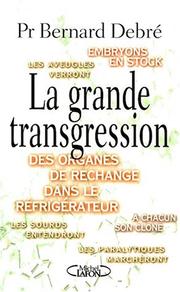
ISBN: 2840986345 9782840986348 Year: 2000 Publisher: Paris Lafon
Abstract | Keywords | Export | Availability | Bookmark
 Loading...
Loading...Choose an application
- Reference Manager
- EndNote
- RefWorks (Direct export to RefWorks)
Human genetics --- 17.023.33 --- 575 --- biomedisch, medisch-wetenschappelijk onderzoek --- biomedische technologie --- verbetergeneeskunde (mensverbetering) --- genetische engineering (manipulatie) --- genetische verbetering (maakbare mens) --- ethiek (ethische aspecten) --- Genetics --- Heredity, Human --- Human biology --- Physical anthropology --- recherche biomédicale --- technologie biomédicale --- médecine de l'amélioration (médecine d'amélioration) --- génie génétique (ingénierie génétique) --- amélioration génétique --- ethique (aspects ethiques)

ISBN: 0226712397 0226712400 Year: 2000 Publisher: Chicago University of Chicago press
Abstract | Keywords | Export | Availability | Bookmark
 Loading...
Loading...Choose an application
- Reference Manager
- EndNote
- RefWorks (Direct export to RefWorks)
In the early 19th century, body snatching was rife because the only corpses available for medical study were those of hanged murderers. With the Anatomy Act of 1832 the bodies of those who died destitute in workhouses were appropriated for dissection. This text explores this history. In the early nineteenth century, body snatching was rife because the only corpses available for medical study were those of hanged murderers. With the Anatomy Act of 1832, however, the bodies of those who died destitute in workhouses were appropriated for dissection. At a time when such a procedure was regarded with fear and revulsion, the Anatomy Act effectively rendered dissection a punishment for poverty. Providing both historical and contemporary insights, "Death, Dissection, and the Destitute" opens rich new prospects in history and history of science. The new afterword draws important parallels between social and medical history and contemporary concerns regarding organs for transplant and human tissue for research.
Body snatching --- Dead bodies (Law) --- Funeral rites and ceremonies --- Human dissection --- biomedisch, medisch-wetenschappelijk onderzoek --- lichaamsmateriaal (lichaam, menselijk lichaamsmateriaal) --- dissectie (ontleding) --- recherche biomédicale --- matériel corporel humain, (corps humain) --- dissection --- Anatomy, Practical --- Practical anatomy --- Dissection --- Funerals --- Mortuary ceremonies --- Obsequies --- Manners and customs --- Rites and ceremonies --- Burial --- Cremation --- Cryomation --- Dead --- Mourning customs --- Law --- Theft --- Law and legislation --- Great Britain --- Social conditions
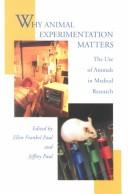

ISBN: 076580025X 0765806851 Year: 2001 Publisher: New Brunswick Transaction
Abstract | Keywords | Export | Availability | Bookmark
 Loading...
Loading...Choose an application
- Reference Manager
- EndNote
- RefWorks (Direct export to RefWorks)
Animal experimentation has made a crucial contribution to many of the most important advances in modern medicine. The development of vaccines for deadly viruses like rabies and yellow fever depended upon animal research, and much of our basic knowledge about human health and physiology was discovered through the use of animals as well. Inspite of these gains, animal rights activists have been zealous in communicating to the public and policymakers their view that the use of animals in medical research is morally wrong and should be severely curtailed or eliminated. The activists' arguments draw upon a range of disciplines and focus on both practical and ethical aspects of animal experimentation. Advocates of animal experimentation have been slow to respond to these arguments. Given that the worldwide toll of communicable diseases is still immense--and that deadly new pathogens may emerge at any time in the future to menace human health--failing to defend animal experimentation from the arguments of its opponents has disastrous implications. A quick response to an unanticipated threat on the order of the AIDS epidemic is unimaginable absent a vigorous research establishment, which in turn is dependent on animal proxies. This work is an attempt by research scientists and moral philosophers to mount a defence against animal rights enthusiasts. Contributors scrutinize how animal experimentation functions in the laboratory, the role that it plays in eradicating disease, and the moral justification for using animals. "Why Animal Experimentation Matters" is a first attempt by research scientists and moral philosophers to mount a convincing defense against animal rights enthusiasts. Because opponents of animal experimentation come from a variety of intellectual backgrounds, this defense is necessarily interdisciplinary as well. In this collection of eight essays, the authors scrutinize how animal experimentation actually functions in the laboratory, the vital role that it plays in palliating and eradicating human and animal diseases, and the moral justification for sacrificing animals for the betterment of human life. The subjects covered in the essays include the moral status of animals and persons, the importance of animals for advancing scientific knowledge, the history of animal experimentation (and of its detractors), differing theoretical approaches of American and European animal-experimentation regulations, the heavily restrictive legislation promoted by animal rights activists, and the threats posed to research and researchers by violent animal rights zealots. This important anthology will be of interest to scientists, philosophers, individuals suffering from heritable or communicable diseases, relatives of afflicted individuals, and policymakers.
Animal experimentation --- Animal models in research --- Animal welfare --- Animals --- Medicine --- Moral and ethical aspects. --- Treatment --- Research --- experiment, experimenteel onderzoek (dieren, dierproeven) --- medisch-wetenschappelijk onderzoek --- ethiek (ethische aspecten) --- expérimentation sur l'animal --- recherche médicale --- ethique (aspects ethiques) --- Health Workforce --- Biological models --- Laboratory animals --- Moral and ethical aspects --- Research&delete&
| Listing 1 - 10 of 46 | << page >> |
Sort by
|

 Search
Search Feedback
Feedback About UniCat
About UniCat  Help
Help News
News